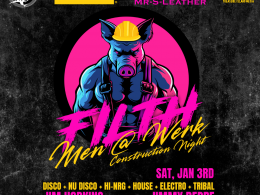We’re sure they probably think they’re doing the best they can. But if a writer asks Paul for answers to specific questions, and Paul writes answers that are thoughtful and honest, isn’t it fair to assume that the writer will use those answers rather than simply make stuff up?
In the case of Edith Damewood, a cub reporter for something called the Willamette Week, apparently not. Here is a paragraph from Ms. Damewood:
“Morris says movies that show men using condoms only serve to keep them in what’s labeled the “appalling phenomenon of the HIV closet.” Advances in medications, he says, have made HIV virtually a nonissue.”
And here’s the complete correspondence between Damewood and Paul Morris, with Morris’ verbatim answers. If you can find anything like what Damewood wrote anywhere, we’ll send you a crazy prize.
Ms. Damewood: “Why no condoms? I’ve read other places it’s a political statement. Tell me about that?”
Paul Morris: Tonight I was watching one of my favorite movies, Michael Powell’s The Red Shoes (from 1948). There’s a moment early on in which a young aspiring dancer, Victoria Page, meets impresario Boris Lermentov. Lermentov, an arrogant man, asks her a question that’s meant to brush her off.
BL: Why do you want to dance?
Instead of being put off, she respond with her own question:
VP: Why do you want to live?
BL: Well, I don’t know exactly why, but I must.
VP: That’s my answer too.
I don’t want to seem glib, but this interaction brought you and your questions to mind. You ask “Why no condoms?” I can give you a hundred answers, but in the end I doubt that it would make more sense to you.
Is it about politics? No, although it’s quickly getting there. It’s about culture and identity and life. I remember very clearly, prior to what came to be known as the “Gay Rights” movement, a period during which it was common for people to ask me if I wasn’t just being willful, obstinately different because I preferred to have sex with men. This was before the word “gay” came into common usage and before the entire epistemological and political bulwark had been constructed to support the identity against mainstream hate.
It was also common in those days to say that, since it was “just sex”, one should be able to take care of it discretely (albeit illegally) and still do the right thing: marry a young woman, raise a brood of children.
But it isn’t “just” about sex. Sex is the primary marker, the central behavior, yes. But being “gay” is much more than that. Since you’re a young woman who lives in Portland, you get this.
Nearly twenty years ago I began to shoot porn in San Francisco and elsewhere. It was the natural thing for me to do: my entire life had revolved around men, their lives, bodies, their sex and sexuality. I won’t go into unnecessary detail here (and risk boring you), but it was–and is– the defining passion of my life.
When I began to shoot porn, I was working for an already established studio that shot “condom porn”. At every shoot, the men involved would have sex behind the camera in order to get ready. They would always fuck without condoms and, when it was time to get in front of the camera, they’d put on a condom. Once the camera was off, the condom was gone.
This was at a time when seroconversion was tantamount to a fairly quick and very unpleasant death. (Of course, an even worse death resulted if you were unlucky enough to take what was then the “medicine”, AZT.)
I came to know these men and many like them, not only San Francisco but around the country. They always fucked without condoms. (Incidentally, I’ve never used a condom in my life. Not once.) The only men who seemed to consistently use condoms were porn actors who wore them in front of the camera. And the sex that was captured by the camera in no way resembled the sex that I was seeing–and engaging in–everywhere. A basic lie was being told to the cameras and to the men who were watching the videos.
Pornography has always been a central focus in the development of gay mens’ understanding of themselves. It functions in ways that are quite different from straight porn. I decided to film sex the way these men and I were having sex, without moralistic judgement, privileging honesty and actual documentation. I made a first video, an audience found me and demanded more. My job became turning on the camera and simply recording the truth of what men do with each other.
But your question “Why no condoms?” isn’t just about how I started my work. You mean more than that, I’m sure. Why do these men not wear condoms, despite the risks? Are they weak-minded or frivolous or insane? No. We’re not. What might from the outside read as social or epidemiological irresponsibility is actually a strict and crucial allegiance to the truth of one’s own life.
“Why no condoms?” Because sex among men, while not about child-production, has a creative function that is the equivalent of making babies. You make babies; we ‘breed’. To an extent that can’t be understood by an outsider, this creative function relies on the experience–the incorporation–of semen. To use a phrase that I coined years ago, it is the necessity of unlimited intimacy.
There was a club in San Francisco in the 1970s that consisted of a warehouse filled with glory hole booths. It was common–and very easy–to get lost there and to spend hours sucking cock and being sucked. The experience would begin awkwardly, develop into lusty hunger and invariably lead to a profound
state of sex-based trance which was nothing less than religious. If a friend visited from out of town, I’d drop them off there for an evening. When I picked them up, they would always come out changed, astonished by the spiritual state that the experience had given to them so quickly, so easily, so generously.
The countless numbers of brilliant, wonderful men who died because of hiv died as martyrs not only to the founding of the gay political movement, but also to the discovery and exploration of a populistic and spiritual epistemology of the body that is grounded in male-male sex.
So, when I began shooting porn I had the choice of either lying about the nature of our sex, rendering it as something that was less than I knew it to be, or of telling the truth and continuing a lineage that had cost a very great price indeed. What would you have done?
Is this political? Inasmuch as religion is political and being true to one’s identity is political, yes. I won’t go into what it all means–you asked for answers, not essays–other than to say that these acts and behaviors are primary to the core identities of the men who practice them.
I recently read Bear Gryll’s “Facing Up”, the story of his ascent of Mt. Everest. Much of the book is devoted to his conjecturing as to his motivations, the nature of this need to climb the tallest mountain on the planet. He notes early on that one out of every six climbers dies on Everest. Let me repeat that: one out of six dies. There is, in fact, a large area nearing the summit called the “Death Zone” in which, due to the lack of oxygen, one’s body literally begins to consume itself in an effort to survive.
I’ve always been terrifically interested in and supportive of transexuals. These men and women know from an early age that in order for them to fulfill their identity, in order to simply be who they truly are, massive, dangerous, expensive medical and psychological changes will have to be endured. This is a different sort of Everest, yet just as difficult to conquer.
And, while I’ve never been interested in birth-families, marriage and so on, I understand that many believe that this ritual and the consequent birthing or adoption of children, plus the process of raising those children are all necessary elements of the realization of their true, deep identity, their purpose. A third Everest, if you will.
I will never be a parent; I’ll never be a transsexual; I’ll never climb Everest. But my experience of the world and language of sexual connection and communion among men, the complexity of the phenomenon individually and socially, the profound creative world that opens when two men simply approach each other unfettered and open, this is my Everest and the Everest of the men with and for whom I work.
From within my culture, this makes perfect sense. From within yours, it might take an unusual step of empathy and an exercise of imagination. I exercise the same empathy and imagination when I appreciate and honor transsexuals, mountain climbers, parents.
AD: Why no condoms?
PM: Why do you breathe?
AD: Because I must.
PM: That’s my answer as well.













Sheesh. Self-important much? After an answer like that, I’m surprised the intereviewer didn’t follow up with, “Oh, just get over yourself, girl.”